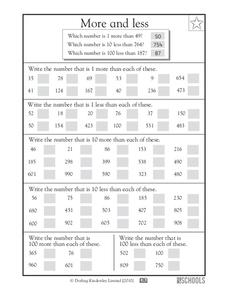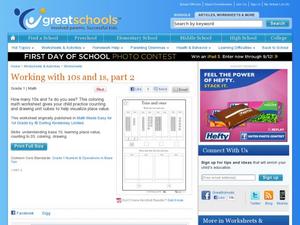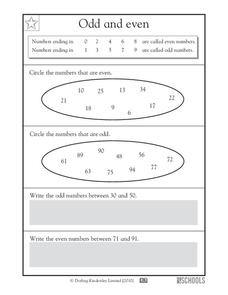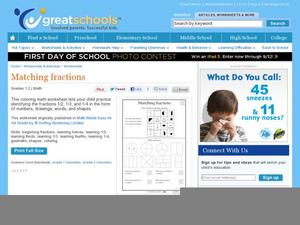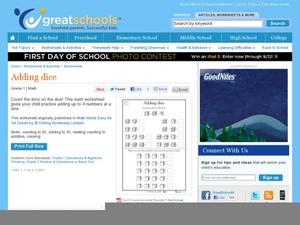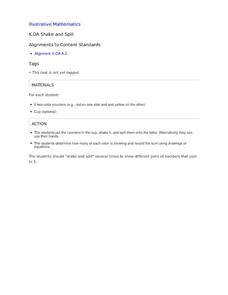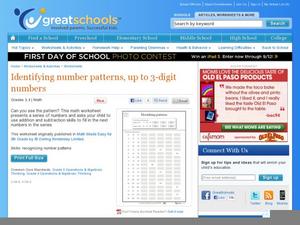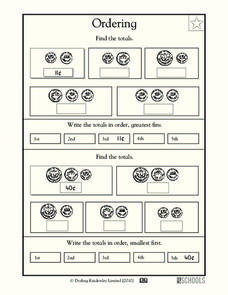Worksheet Universe
Winter Counts-- Counting to Ten
For this math worksheet, students practice counting sets of objects from 1 to 10. Students count the objects pertaining to winter in each of 8 boxes and write the correct number in the box.
Curated OER
My Teeny Tiny Book (Counting to Ten in Different Languages)
In this counting to ten mini book, students cut out and color a book that shows the numbers from 1-10 and the words for the numbers. The languages in this book are: English, Spanish, French, Swedish, Japanese and Swahili. Pronunciation...
Print and Practice
Read and Draw Shapes to Number 10
In this read and draw instructional activity, students read a number at the beginning of a row, then draw that many of the shapes given, circles or triangles. Numbers 1-10 are used.
Curated OER
My Elephant Counting Book (1 to 10)
In this elephant counting book learning exercise, students cut out, color and assemble a mini book with the numbers 1 to 10. Each page has a number and the corresponding pictures of elephants.
Illustrative Mathematics
Party Favors
Pia is putting stickers into party bags. She starts by putting 10 stickers in each bag, and over the course of a week she adds several bundles of ten stickers to each bag, as well as making more bags. Second graders must find the number...
Terry Kawas
One Hundred Shoes
Practice counting and patterns in one fun activity! After discussing the word cent and what it means, kids count the number of body parts on the centimeter and add two legs to each. They then determine if there is a faster way to...
Curated OER
More Than or Less Than?
How many apples is less than five? Each of these problems has two images, one with quantifiable details and one without (i.e. a tree with apples and an empty tree). Answers will vary as young counters draw objects onto the second image...
Curated OER
More and Less
Mental mathematicians add and subtract 1, 10, and 100 from sets of numbers. Each set of one, two and three-digit numbers gives scholars a chance to practice their addition and subtraction skills. There are 62 whole numbers in all. What...
Curated OER
Sets Of
Represent multiplication as sets of items for beginners to this concept. They look at six familiar object sets and determine the total number of legs by counting the sets. There is some scaffolding here, as the first is done for them and...
Curated OER
Working with 10s and 1s, Part 2
Practice place value by visualizing 10s and 1s. First graders count the cubes in each place, then write the total number at the bottom. In one particularly helpful section, they draw the cubes that will add up to a given number. Bring in...
WakeGOV
Plastic Sight Words
Plastic math? Have young learners count and name the number of plastic items in their centers. Kindergartners match sight word cards to the number of plastics in a given group, while learning that plastics come in all different shapes,...
Curated OER
Odd and Even
After you've introduced even and odd numbers give pupils this exercise for some independent practice. A brief introduction gives them the definition of even and odd by listing the ending numbers for both types. Be sure to reinforce the...
EngageNY
Counting Rules—The Fundamental Counting Principle and Permutations
Count the benefits of using the resource. The second installment of a 21-part module focuses on the fundamental counting principle to determine the number of outcomes in a sample space. It formalizes concepts of permutations and...
Curated OER
Matching Fractions
Focus on halves, thirds, and fourths in these visual fraction activities. Scholars begin by examining a grid with various expressions of the three fractions displayed in the grid squares. They color-code the grid to indicate which...
Curated OER
Identifying Patterns
Explore number attributes and skip counting through patterns! Scholars find the pattern in each of these sequences and continue it by writing in the remaining values. They count consistently by various intervals, sometimes forwards and...
Curated OER
Adding Dice
Roll the dice! These addition number sentences are for beginning mathematicians, and each addend is displayed on a die. Learners add up two or three single-digit addends to find eight sums in the first half of this worksheet. Next, they...
Curated OER
Reading Numbers
Teach number value to 20 through sets of objects. Young pupils use the number given for each of the four sets to determine how many should be colored in. How many are left? There is an addition box that has been left blank so scholars...
Curated OER
Most and Least
Which one has the most? Each row has three sets of identical objects, and scholars compare the sets to determine which has the most or the least (they find the most for the first four and the least for the last four). One example is...
Curated OER
Tallies
Tally Marks are a wonderful way to keep track of data, and to foster counting for your young mathematicians. This resource has learners identify the correct number of tally marks for a given number. The numbers used are: 13, 15, 17, and...
Illustrative Mathematics
Christina's Candies
Help Christina figure out how many chocolate and lemon candies she has with a lesson on decomposing numbers. When presenting this context to the class, the teacher chooses the total number of candies and the number that are chocolate,...
Curated OER
Identifying Patterns
Find the pattern! Eighteen number sequences challenge scholars to identify and complete the pattern, adding at least four digits to the given numbers. All the sequences here involve skip counting by various single-digit numbers,...
Illustrative Mathematics
Shake and Spill
Entertaining as well as educational, this math activity about decomposing numbers is bound to capture the engagement of young learners. Given a cup and five two-color counters, young mathematicians simply shake and spill the cup,...
Curated OER
Identify Patterns
To complete these number patterns mathematicians must determine by what number each is constantly increasing. However, this isn't your typical skip counting; scholars count by numbers like 18, 60, and even 101 to fill in the missing...
Curated OER
Ordering
Money is a great medium for math problems, and learners practice with coins in these addition equations. First, they add up five sets of coins (one is done for them), writing down the totals below each. Next, scholars sequence these...







